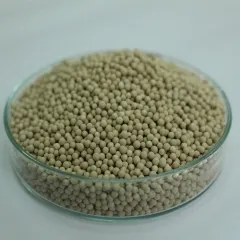Overview of Molecular Sieve:
A molecular sieve is a synthetic molecular sieve material with pores of precise and uniform structure and size. This enables them to preferentially adsorb gases and liquids based on molecular size and polarity. Zeolite molecular sieves are naturally occurring highly porous crystalline solids that belong to a class of chemicals known as aluminosilicates.
The usefulness of molecular sieve
Molecular sieves are used to dry gases and liquids and to separate molecules according to their size and shape. When two molecules are equally small and can enter the pores, the separation is based on the polarity of the molecules (charge separation), with the more polar molecule being preferentially adsorbed.

What are the types of molecular sieves?
There are four main types of sieves: molecular sieve 3A, molecular sieve 4A, molecular sieve 5A and molecular sieve 13X. The type of molecular sieve depends on the chemical formula of the molecule, which determines the size of the pores.
Molecular sieves work by adsorbing gas or liquid molecules whose effective diameter is larger than the pores, except for gas or liquid molecules with larger openings. The molecular sieve related to this field is type 3A, and the molecular sieve used for insulating glass is called 3A.
3A molecular sieve has fast adsorption speed and high recovery frequency, which explains the oil well damage and pollution. 3A molecular sieve is used in the drying of gasoline, polymerization, chemical gas-liquid dry refining and the petrochemical industry.
How to use a molecular sieve?
Molecular sieves are used for dehydration and solvent dehydration is used in the final stage of embedding. Molecular sieves are typical zeolite compounds that strongly adsorb water and have carefully controlled pore sizes.
How does a molecular sieve remove water?
Molecular sieves are crystalline metal aluminosilicates with a three-dimensional interconnected network of silicon-aluminium tetrahedra. The natural water of hydration is removed from this network by heating, creating uniform cavities that selectively adsorb molecules of specific sizes.
Molecular Sieve Supplier:
We offer different types of molecular sieves. Welcome to send us an email or click on the desired product to send an inquiry.

Payment Term:
T/T, Credit Card, Western Union, Paypal etc.
Term for delivery:
By air, courier or by sea according to the needs of the customer.
Conditions of storage:
1.) Maintain a dry area at the temperature of room.
2.) Avoid high and damp temperatures.
3.) Utilize immediately following the opening of the bag inside.
FAQ:
Q1:
What is a molecular sieve?
Re:A molecular sieve is a material with uniform micropores, mainly composed of silicon, aluminum, oxygen, and other elements. Its pore size is equivalent to the general molecular size so that it can be screened according to the molecular size. Zeolites can be divided into natural zeolites and synthetic zeolites with the general chemical formula (M '₂ M)O·Al₂O₃ xSiO₂·yH₂O, in which M 'and M are univalent and bivalent cations such as K +, Na + and Ca² +, Ba² +, etc.
A molecular sieve has adsorbability, ion exchange, and catalytic properties. It is widely used in the fields of organic chemical industry and petrochemical industry, gas dehydration, waste gas purification, and so on. Common molecular sieve types are 3A (potassium type A), 4A (sodium type A), 5A (calcium type A), 10Z (calcium type Z), 13Z (sodium type Z), Y (sodium type Y), and so on.
Q2:
What are the advantages of molecular sieve?
Re:High selectivity: Molecular sieve has a high degree of selectivity, mainly manifested in the selectivity of different molecular sizes, shapes, and polarity. This selectivity gives molecular sieves a wide range of applications in catalysis, adsorption, separation, and gas storage.
Thermal and chemical stability: The molecular sieve has high thermal stability and can work in high temperatures, strong acids, alkalis, and other harsh environments. This makes molecular sieves have a wide range of applications in industry, such as refining oil and gas separation.
Adjustable pore size and distribution: The pore size and distribution of molecular sieves can be adjusted through chemical synthesis, post-treatment and control processes to control its performance and application. This controllability facilitates the design and optimization of molecular sieves for specific applications.
Efficient moisture-proof: The molecular sieve is a very effective moisture-proof material, which can absorb moisture in the air, keep the environment dry, and effectively prevent moisture.
Environmental protection and health: molecular sieve material does not contain any toxic substances, will not release harmful gases when used, has no pollution to the indoor environment, and is very suitable for use at home.
Q3:
What are the application areas of molecular sieve?
Re:Catalytic field: A molecular sieve can be used as a catalyst or catalyst carrier for various chemical reactions, such as cracking, isomerization, renormalization, alkylation, dehydrogenation, aromatization, ammonia synthesis, hydrogen production, etc.
Adsorption and separation: Because the molecular sieve has a uniform micropore structure and high specific surface area, it has a strong adsorption capacity. It can be used for gas drying, purification, separation, storage, liquid dehydration, and purification.
Environmental protection: Molecular sieves can be used as an adsorbent or catalyst for waste gas purification, water treatment, and sewage treatment, which helps to reduce environmental pollution.
Pharmaceutical industry: molecular sieves can be used for drug synthesis, air treatment, and increased drug absorption and penetration, such as a drug adsorbent, separation agent, stabilizer, etc.
Q4:
What is the molecular sieve used for air purification?
Re:In air purification, the molecular sieve is mainly used as an adsorbent. It has the characteristics of porosity, large surface area, and strong adsorption capacity and can be adsorbed by selecting adsorbents for specific organic molecules. Different molecular sieves have different pore sizes, and different molecular sieves can be selected to adsorb molecules of different sizes according to needs. Therefore, molecular sieve has a wide range of applications in the field of air purification, especially in deodorization and adsorption of harmful gases, such as formaldehyde, benzene and so on.
Q5:
What are the technical parameters of molecular sieve?
Re:Static water adsorption: static water adsorption is one of the main indicators of molecular sieves, which indicates the adsorption capacity of molecular sieves for water. The size of the static water adsorption capacity reflects the quality of the molecular sieve, usually expressed as the mass of water adsorbed per gram of molecular sieve (mg/g).
Adsorption of specific medium quality: A molecular sieve can also be based on its main use and standard pore size. The use of a specific medium to detect and obtain the quality of its adsorption of a specific medium directly indicates the quality of the molecular sieve.
Compressive strength: Because the molecular sieve is often subjected to pressure changes during use, compressive strength is an important technical index. The relationship between compressive strength and adsorption capacity is inversely proportional.
Packing density: Packing density refers to the mass of molecular sieve per unit volume. The packing density is proportional to the compressive strength; the higher the packing density, the better when the adsorption capacity is unchanged.
Wear rate: The wear rate indicates the degree of particle wear of the molecular sieve during use. The lower the wear rate, the less dust in the molecular sieve, and the smaller the impact on the equipment, so the wear rate is one of the important indicators of molecular sieve quality.
Packaging water content: Packaging water content refers to the water content of molecular sieves when packaging. The smaller the water content of the package, the less pre-adsorption of the molecular sieve during storage and transportation, which can reduce unnecessary regeneration treatment for the user.

